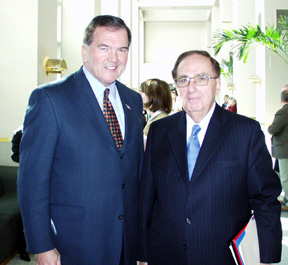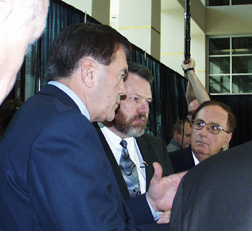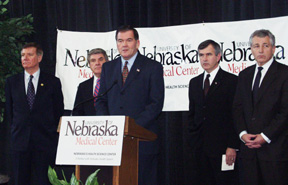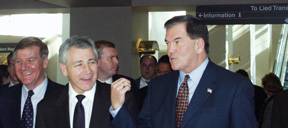 |
Homeland Security Advisor Tom Ridge, left, with UNMC Chancellor Harold M. Maurer, M.D. |
Gov. Tom Ridge, former governor of Pennyslvania and advisor for the Office of Homeland Security, spent two hours on the UNMC campus learning about bioterrorism preparedness efforts that have national implications. Gov. Ridge was appointed to his federal position following the Sept. 11 terrorist attacks.
“You’ve taken it upon yourselves to create a capacity here that has the potential for national implications,” Gov. Ridge said, “because of the convergence of expertise, technology and existing capacity that you have at the university.
“Nebraskans have demonstrated a great deal of vision, foresight and extraordinary capacity to bring people together and plan. It is my hope that in the weeks ahead that the same vision and foresight of bioterrorism will be reflected by some action of the Congress of the United States so that we have a department of homeland security.”
 |
Homeland Security Advisor Tom Ridge, left, Rod Markin, M.D., Ph.D., and UNMC Chancellor Harold M. Maurer, M.D., view Lab-InterLink’s automated lab. |
During his two-hour visit Friday, Gov. Ridge — along with a Congressional delegation of Sen. Ben Nelson, Sen. Chuck Hagel, Rep. Doug Bereuter and Rep. Lee Terry — viewed a demonstration of an automated mobile lab that can test at least 32,000 vials a day. With its automated system, a barcoded tube containing a patient’s blood, urine or other body fluids is placed into a transportation carrier with the same barcode, enabling the computer to track its movement down the conveyor line as automated, standardized tests are conducted.
The automated system, developed by Lab-InterLink, can be set up in 48 hours and is mobile enough to be placed in a van or on a truck in the case of a bioterrorist attack. The company, founded in 1993 by Rodney Markin, M.D., Ph.D, professor and vice chairman of UNMC’s department of pathology and microbiology and the associate dean for clinical affairs for the College of Medicine, has systems throughout the United States, Canada, Europe and the Middle East.
“We have the greatest concentration of advantages in this field of anywhere in the United States,” said UNMC Chancellor Harold M. Maurer, M.D. “Already, we’ve been recognized by the federal government for our unique, cutting-edge efforts in bioterrorism preparedness. Now, we’d like to take that one step further.”
Dr. Maurer was referring to the National Emergency Preparedness Laboratory, a facility that UNMC is proposing to augment the Centers for Disease Control and Prevention.
A collection of sound bites from Friday’s press conference with Homeland Security Advisor Tom Ridge. |
Tom Ridge on Nebraska’s vision. |
Rep. Doug Bereuter |
Sen. Chuck Hagel |
Tom Ridge on the state’s potential. |
Tom Ridge on the state’s bioterrorism preparedness. |
Sen. Ben Nelson |
Gov. Mike Johanns |
Nebraska Gov. Mike Johanns said the state would benefit from a new center at UNMC. He also lauded the efforts in bioterrorism preparedness across the state, many of which took shape before the Sept. 11 terrorist attacks. Gov. Johanns lauded the work of Lt. Gov. Dave Heineman, who is directing Nebraska’s homeland security efforts, and Chief Medical Officer Richard Raymond, M.D.
“Nebraska was a leader in bioterrorism preparedness long before the cowardly acts of Sept. 11. Those tragic events moved our efforts to the forefront, and we’re well ahead of the game in making sure we have expertise and plans in place to handle a statewide emergency,” Gov. Johanns said.
Steven Hinrichs, M.D., director of the Nebraska Public Health Laboratory and a UNMC faculty member, said that several factors make Omaha the best location, strategically, to house the facility that would augment the CDC’s work.
In addition to the expertise of several UNMC scientists, Omaha is a leading transportation center, with bisecting interstates and a major train hub; has fiber optic connectivity capability that is unmatched; is home to Offutt Air Force Base, from where U.S. presidents can link to key Defense personnel and other Cabinet members during wartime; is home to the world’s largest medical lab automation company, Lab-InterLink, which would provide for thorough and fast diagnostic testing during a disease outbreak; and has the support of its private community members.
“(As a state) you’ve been leaning as far forward as you possibly can so you probably are ahead of quite a few states,” Ridge said during an afternoon press conference. “(Today’s presentation) shows me how far forward you have gone not just in thinking about bioterrorism, but how you can develop the infrastructure, physical intellect and technology to deal with it.”
UNMC’s bioterrorism preparedness efforts range from increased research to a bolstered curriculum. It also includes:
 |
Homeland Security Advisor Tom Ridge addresses the media. In the background are, from left to right, Rep. Doug Bereuter, Sen. Ben Nelson, Gov. Mike Johanns, and Sen. Chuck Hagel. |
Bioterrorism Preparedness – Special Pathogens Branch — The state of Nebraska received bioterrorism funds, of which a portion was given to the Nebraska Public Health Laboratory, to develop a special pathogens branch. UNMC faculty member Tony Sambol leads this branch, which deals with organisms, such as anthrax, that could be used as bioterrorism agents.
Public Health Laboratory Information Program (PHLIP) — The U.S. Department of Health and Human Services awarded a $300,000 grant to UNMC to streamline test ordering and processing with the Nebraska Public Health Laboratory clients throughout the state, using Internet technology to very rapidly determine results.
National Electronic Disease Surveillance System (NEDSS) — The Centers for Disease Control designated Nebraska as one of the two base system development sites for the NEDSS. State epidemiologist Tom Safranek, M.D., is leading this project, and has worked closely with UNMC.
 |
Homeland Security Advisor Tom Ridge, right, arrives in the Durham Outpatient Center. |
Bioterrorism Medical Education Consortium — The Centers for Disease Control awarded Nebraska a grant of $170,000 in 2002. UNMC and Creighton University will use this money to develop a Bioterroism Medical Education Consortium, which will educate health providers (e.g. emergency personnel, physicians, nurses) around the state on the medical aspects of bioterrorism.
UNMC Health Professions Tracking Center (HPTC) — The HPTC was initially developed to document the retention of UNMC medical graduates in the state of Nebraska, focus on critical shortage areas, monitor trends and observe relocation patterns of health professionals. Over the past seven years, the HPTC has expanded to maintain an up-to-date database of contact information and practice characteristics for many different health professionals including physicians, nurse practitioners, pharmacists, physician assistants, dentists, infection control nurses, laboratory directors, clinics, hospitals and pharmacies in Nebraska and Western Iowa. It is now widely recognized that the HPTC, led by Kolene Kohll, provides the capability essential for real-time notification of health professionals, including emergency drug recalls, legislative initiatives and alerts associated with bioterrorism preparedness.
Several community and governmental leaders were on hand Friday including Lt. Gov. Dave Heineman, and Omaha business leaders Walter Scott, Chuck Durham, John Gottschalk and Mike Yanney.